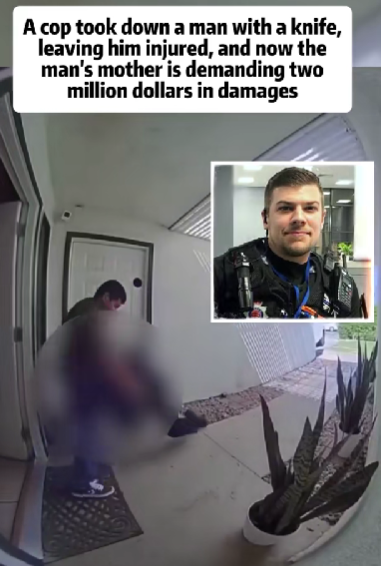A heated confrontation between a police officer and a knife-wielding man has sparked major public debate after bodycam and doorbell footage revealed the tense moments leading up to the incident. The man’s mother is now demanding $2 million in damages, claiming her son was wrongfully injured and that the officer used unnecessary force.
The incident occurred earlier this year in a quiet suburban neighborhood after multiple 911 calls reported a man acting erratically with a knife. When officers arrived at the scene, they encountered a visibly agitated individual pacing near a front porch, refusing to drop the weapon despite repeated verbal commands.
According to official reports, the responding officer — whose name has since been publicly identified — claimed he fired his weapon only after the suspect advanced toward him, posing a clear threat. The man was struck and later taken to a nearby hospital with serious but non-life-threatening injuries.
Doorbell footage, which has since circulated widely online, shows a chaotic scene: the officer shouting for the man to drop the knife, followed by a quick, decisive response as the situation escalates.
In a press statement, the man’s mother condemned the officer’s actions, saying her son was “in a mental health crisis and needed help, not bullets.” She has since filed a civil lawsuit against the department, seeking $2 million in damages for what she describes as “excessive force and emotional trauma.”
“The system failed my son,” she said during a press conference. “He was scared and confused. Instead of de-escalating, they escalated.”
Police officials, however, defended the officer’s response, citing the immediate danger posed by the armed suspect. “Our officers are trained to prioritize safety,” said Chief Daniel Harper. “When someone approaches with a weapon after multiple warnings, the officer must act to protect themselves and the public.”
The case has reignited debate over how law enforcement handles individuals experiencing mental health episodes, especially when weapons are involved. Critics argue that officers too often resort to force rather than non-lethal intervention or crisis-trained units.
Civil rights attorney Alicia Rodriguez, who represents the family, says the footage raises serious questions about the timing and necessity of the officer’s actions. “The video shows hesitation and confusion — not aggression,” she said. “There were other options available.”
The officer involved has been placed on administrative leave pending an internal review. Meanwhile, the city’s attorney’s office has confirmed the lawsuit is under legal evaluation, but no settlement discussions have yet taken place.
Community reactions have been divided. Some residents support the officer’s decision, believing he acted to prevent tragedy, while others side with the family, demanding accountability and reform.
“This isn’t just about one case,” said activist group spokesperson Raymond Ellis. “It’s about how we treat people in crisis and how quickly those moments turn deadly or life-altering.”
As the lawsuit moves forward, the family’s attorney insists their goal is not just compensation — but change. “No parent should have to watch their child suffer from a system that refuses to adapt,” she said. “This could have ended very differently.”
